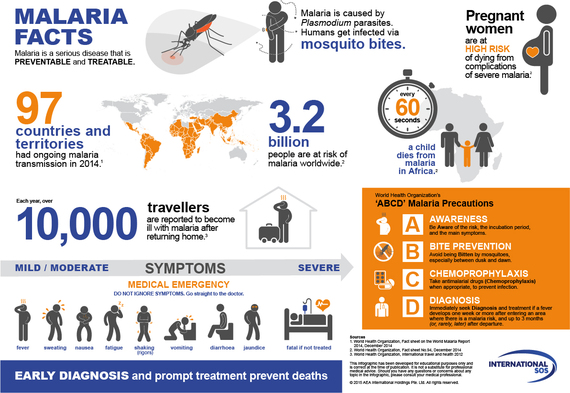Eliminated long ago in the U.S., malaria isn't considered a serious threat by many Americans. But as companies and organizations expand their global footprint and send employees to new markets, World Malaria Day is a much-needed reminder that this serious, and at times fatal, disease still has a devastating impact not only on communities around the world, particularly in Africa, but on business travelers and expatriates as well.
Africa's diverse region continues to appeal to companies around the world. Business travel from Western countries has surged across the continent, including areas where malaria is endemic. Our own data shows that business travel to malaria-impacted countries in Africa has risen more than 60 percent in recent years. And with this, malaria has become the number one cause for hospitalizations and evacuations among travelers and expatriates in the region. While there is no vaccine, malaria is both preventable and curable. But travelers, expatriates, businesses, NGOs and universities must know the risks before traveling abroad. And getting accurate information out about prevention is the first step.
For those of us who oversee employee health around the globe, it's not uncommon for us to hear a story of an employee traveling to Ghana, for example, and because they're going for a short period of time, the idea of contracting a disease doesn't enter their mind or that of their employer. The employee isn't educated on the proper precautions needed in order avoid an infectious disease like malaria putting them at a much higher risk as a result. The infographic below illustrates how far reaching malaria still is these days.
Furthermore, more than forty Fortune 500 international companies were recently surveyed about the health challenges they face as their global presence expands. While most respondents indicated they provide their travelers with a briefing on health risks and preventive measures, as well as a medical consultation before they depart, only one in 10 provide malaria training or track those who have received training. Full results were recently published in Corporate Health Trends: 10 Key Recommended Actions to Protect your Global Workforce by the International Corporate Health Leadership Council (ICHLC).[1]
Companies must exercise Duty of Care and define their training procedures and policies toward malaria if they have employees operating in potentially disease-risk areas. Even a quick business trip can be a fatal one without appropriate measures in place. With that, employers should keep the following points in mind:
• Malaria prevention programs reduced the occurrence of fatal cases by 70 percent. At the same time, the cost-benefit analysis of the employee malaria prevention program showed for each $1 invested, the return was estimated at $1.32. [2]
• Take appropriate, evidence-based approaches to preventive medication for their employees (known as "chemoprophylaxis");
• Provide access to clinical services and medical assistance for malaria case management;
• Provide education and training around personal protection (inclusive of clothing) as well as habits to reduce mosquito bites;
• Give access to quality-assured medication before and during travel: In Sub-Saharan Africa, as many as one-third of all anti-malarial tablets locally sourced are counterfeit.
• Malaria has an incubation period of seven to 30 days. Individuals must remain vigilant even after returning home and advise their family doctor if presenting with a fever of unknown origin.
As companies increase their international presence, they play a vital role in stopping the spread of malaria and must be aggressive in doing so. While huge gains have been made in recent years, there is still much to be done to eliminate the disease in its entirety.
Let's continue to work together and fight for a world free of malaria.
Robert L. Quigley, MD, D.Phil., is the Regional Medical Director and Senior Vice President of Medical Assistance, Americas Region, for International SOS, an international healthcare, medical assistance, and security services company.
1. "Health Trends: 10 Key Recommended Actions to Protect your Global Workforce," International Corporate Health Leadership Council (ICHLC). Download here.
2. "Return on Prevention," Prevent, March 2015. Download here.
